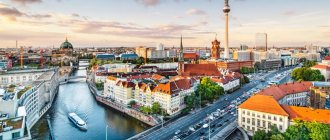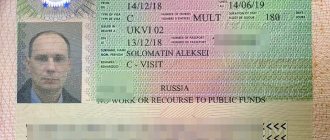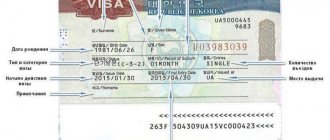How can a Russian get a work visa?
Germany adheres to a loyal policy compared to many other countries of the European Union. However, in the case of citizens of the Russian Federation, only students of German universities can freely enter the territory of the state in question in order to find work.
For other Russians, the procedure is as follows:
- The interested party finds a suitable vacancy on the German labor exchange;
- The prospective employee contacts the employer and negotiates with him;
- During the negotiation process, the working conditions and future salary of the Russian specialist are agreed upon;
- An employment contract is drawn up;
- Information about the new employee is sent by the employer to the Federal Employment Agency and the Immigration Office;
- Authorized employees of the above departments make a decision on granting a foreign citizen the right to employment or on a corresponding refusal;
- If the decision is positive, the Russian has the right to apply for a German work visa.
A package of documents for processing the entry document in question is submitted to the German consulate closest to the place of residence of the interested person.
List of required documents
A citizen wishing to apply for a German work visa must prepare the following package of documents:
- Foreign passport (must have at least two blank pages for affixing a visa);
- Two completed visa forms;
- 2 standard visa photographs, format - 3.5 by 4.5. It is necessary to clarify that the background in the photograph must be white, the face of the person being photographed must occupy at least 80% of the entire area of the photograph;
- An employment contract signed by the employer;
- A document indicating the absence of problems with the law in Germany;
- Pan-European health insurance;
- Bank details indicating payment of stamp duty;
- Certificates and diplomas that serve as confirmation of the qualifications necessary for employment.
The documents listed above must be accompanied by a package of notarized photocopies. Russian documents are subject to mandatory legalization and legal translation into German.
List of required documents
Read the visa requirements on the website of the German embassy in your country. Slight differences may occur.
Immigrants who received entry permission presented the following documents:
- International passport with two copies of the first page.
- Photos - format 3.5 by 4.5 cm, 80% face. Before leaving for Germany, try not to radically change your appearance, remain similar to the photo.
- Language certificate - German or English. Since March 2020, it is mandatory for migrants without higher education.
- Motivation letter - you need to write where you plan to look for a job, in what field of activity. How work experience and education match the job search in this industry. Indicate the companies where you will presumably send your resume.
- Autobiography, aka resume in German - first personal information. Then describe it in chronological order, in tabular form. One column is the date, the second is the periods of study, practice, and work.
- Copy of diploma and ZAB recognition or printout of information from anabin.
- A completed application form and a copy of your foreign passport.
- Travel medical insurance with coverage of at least 30,000 € for 6 months.
- Evidence of financial security - financial guarantee or blocking account.
- Proof of your stay, such as a copy of your hotel reservation or rental contract.
TRANSLATION OF DOCUMENTS INTO GERMAN
We translate and notarize with an understanding of the context and knowledge of German immigration laws. Translations fully comply with the requirements of the German Embassy. We work remotely with clients anywhere in the world.
SEND
Contact directly via [email protected] or Whatsapp
Details, prices
The embassy will ask about the purpose of the trip, ask questions about specific plans - city of residence, prospective employers, language level, etc.
Waiting for a decision usually takes 2-5 weeks.
National visa, usually issued for 90 days. Two weeks before the end, you must contact the department for work with foreigners in Germany, which will extend your visa for another 90 days. But it happens that they issue it for six months at once.
Types of work visa
There are four types of German work visa:
- Working Holiday is a work permit that allows foreign travelers to earn extra money while on a tourist trip. The permit is valid for no more than three months (coincides with the duration of the tourist trip). The only way to get a job that does not require special skills or high qualifications.
- General Employment is a work visa suitable for Russian citizens without higher education or exceptional professional qualities. Allows you to apply for vacancies in the specialties most in demand among Germans. It is mandatory to conclude a work contract with the receiving party. Russians rarely manage to obtain a General Employment permit. The jobs are filled by European applicants.
- Specialist Professional is a type of permit suitable for professionals with higher specialized education, exceptional skills, and impressive experience. The contract implies compliance with German standards of working conditions, wages of more than 86,000 euros annually.
- EU Blue Card - Russians with a higher education diploma recognized by the EU countries can receive a Blue Card. German employers hiring foreign specialists prefer to deal with Blue Card holders. The advantages relate to the minimum wage (4,000 euros monthly), the ability to avoid a four-month search for applicants from the neighboring European community, and duration of validity (up to four years).
German legislation establishes the procedure for selecting specialists as follows: vacancies are posted in the public domain; candidates of native Germans and permanent residents of the country are primarily considered.
Citizens of the European Union and northern European countries have a secondary right to get a job. Applicants from the “third-line” powers (Russians, Ukrainians, Belarusians) are considered after the candidates of the first and second stages are rejected.
Features of a German work visa
According to the Treaty of Rome of 1957, all citizens of states that are members of the European Union have the right to move freely within its borders and work in any of its countries, including Germany. In order for a foreigner who does not have EU citizenship to be able to apply for official employment in the German state, it is mandatory for him to obtain a work visa.
This mechanism was created to protect German citizens from the influx of unskilled labor from abroad, which could deprive the indigenous population of jobs and reduce the productivity of the German economy. Through such visas, the state controls labor migration flows and ensures that only those specialists who are really needed come to the country.
It should be borne in mind that in Germany there is no single type of work visa - there are several types for different categories of citizens. One of the most common looks like this:
Blue Card
The Blue Card is a document that provides a work permit to those specialists who have a higher education and have obtained a job in Germany in their chosen profession.
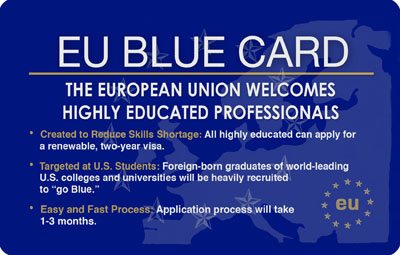
The condition for receiving is the level of working salary. The minimum salary is at least 50,800 euros per year (about 4,000 euros per month), excluding taxes. For specialists in the field of computer technology, doctors, engineers, the salary cannot be less than 39,600 euros per year.
Work Visa and Blue Card
To apply for a German visa, you need to receive an official invitation from your employer. Based on this document, the country’s consulate issues a Blue Card (Blaue Karte), which allows you to work in the state for 3 years, or a work visa, which gives a work permit valid for 1 year.
Immediately after arriving in the country (no more than 10 days after crossing the border), you need to rent housing and conclude an official rental agreement. Next, you need to register with the Office for Foreigners. Only after completing these procedures does the employee have the right to begin working.
Receipt time
The standard period for obtaining a German work visa is 6-12 weeks. In exceptional cases, the production of an entry document of the type in question can be expedited to 1-3 weeks.
Upon arrival in Germany, the holder of a work visa must contact the Registration Office (Einwohnermeldeamt) at the place of intended residence within 7 days. The citizen must then apply to the Immigration Service (Ausländeramt) for a residence permit.
Am I nervous, what should I watch out for?
Here are some tips to keep your composure
- Visas are only valid for a limited time and are often linked to your employment contract. If you leave this job, you will need to reapply for a visa to remain in Germany.
- Not sure whether to bring a specific document to a meeting? Bring everything, just in case. This will make you feel more confident and may even earn you a rare compliment for being well organized!
- If you don't speak German well, bring an interpreter or a German-speaking friend with you to the meeting.
- Be prepared to have your most important documents translated by a certified translator, even if they are all in English.
- Schedule meetings in advance. Immigration and registration offices in Berlin are often booked for weeks.
- Be on time! The Germans are big on deadlines and expect everyone to follow official procedures. They don't appreciate late arrivals or requests for emergency exceptions.
Remember that the people processing your application are people (probably). They want to do a good job, follow the rules, and go home on the weekends. You can make everyone's life a lot easier by being well prepared for meetings and staying organized.
Where can you work on a work visa?
Despite the low unemployment rate and a large number of jobs, Germany does not have a particular need for foreign labor. Refugees from the Middle East and citizens of developing countries of the European Union usually work in jobs that do not require qualified knowledge and special skills. Germany willingly accepts qualified specialists in the following fields:
- Programming and IT technologies;
- Engineering of various industries;
- Architecture;
- Science and medicine.
As for medicine, Germany has been experiencing a serious shortage of nurses and medical assistants in recent years. For this reason, there are numerous programs in Germany to attract young doctors and auxiliary medical personnel to work in this state.
Citizens planning to work in Germany in the field of culture or education can count on being provided with a job only on the basis of a contract and a direct application from the employer.
However, if a citizen of Germany or any other EU state applies for the position they have chosen, the employer’s preference will be given to him. Only EU citizens can count on employment in the field of legal defense or politics.
Business visa
Permission to carry out business projects in Germany can be obtained if, for example, the applicant visits the country as part of a foreign delegation, as a result of business trips, opening or relocating a company, etc. The terms can be short-term or long-term.
To receive it you need to provide the main package of papers:
- A foreign passport that is valid at the time of obtaining the permit.
- A copy of the applicant's national identity document.
- Certificates that confirm the financial independence of a citizen. These include bank statements, certificates of employment, etc.
- A completed application form.
- An insurance policy that can cover medical expenses if the applicant becomes ill.
There is also an extended list of documents that will need to be presented if necessary:
- Hotel reservation.
- Documents that confirm the implementation of business activities.
- In case of business trips - proof of conducting business projects with the German side.
Visa for researchers and scientists
An important condition for obtaining this type of visa is to sign a contract with a research institute. It should explain the qualifications of the scientist and the goals of his work in Germany.

You also need to provide papers that confirm his financial security for the entire duration of his work. When submitting documents, the migrant is issued a visa for three months with the subsequent possibility of obtaining a residence permit.
Visa for nannies and housekeepers
This type of German visa is available to women aged 18 to 28 years. It is necessary to have an agreement to work with a German family. A condition for obtaining a job is that family members should not be close relatives of the applicant.

Provided only for the duration of work in this specialty. After its expiration, you are not allowed to work in another profession.
Visa for volunteers and students
When working as a volunteer, citizens of the Russian Federation can obtain a work visa. To complete it, you need to conclude an agreement with a volunteer organization. It is desirable to have experience in volunteer activities and medical assistance skills.
There are various requirements for volunteers:
- Age limit.
- Good knowledge of German.
- Availability of education (secondary).
- Willingness to work on a voluntary basis without pay.
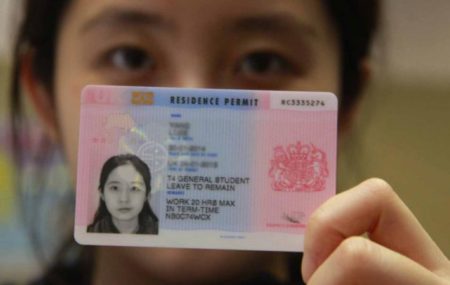
Required documents include:
- summary,
- a questionnaire indicating the goals of volunteering,
- motivation letter,
- school certificate,
- required number of photos.
One of the popular programs for volunteers is “Social Year in Germany”. Brief information about the program in the picture:
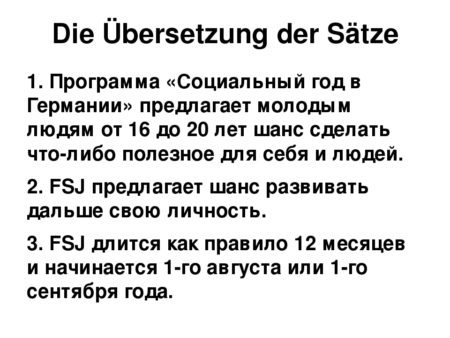
You can also apply as a student for a study permit. To do this, you need to provide standard documents. The peculiarity of a student visa is that when applying for it, you can apply for a residence permit.
Visa for artists
If you belong to a creative profession, then immigration to Germany is different from other methods of moving. Actors, musicians and artists are not subject to the classic work and blue visa requirements.

There are two ways to obtain permission:
- The first is related to the invitation of the German side to perform. To obtain a visa in this case, you need to present an agreement to attend this event, an application to visit the country in this direction.
- In the second method, a creative person does not enter into an agreement with the receiving party and travels to Germany as an independent unit, presenting his creativity. In this situation, the employee must have a specific plan, documents confirming his financial independence, and permission to conduct his creative activity.
The contract of applicants going to work in Germany as artists must clearly indicate whether they are working within the framework of employment or within the framework of liberal professions. In addition, your medical insurance should include a clause covering expenses in case of sports and professional injuries during performances.
Obtaining a work visa to Germany
Applying for a German work visa is primarily related to the presence of an official job offer. The sequence of actions is as follows:
- A potential migrant is looking for vacancies and undergoing an interview.
- Receives an offer and signs a contract.
- Contacts the German embassy.
- Officials are checking the conditions for issuing work permits.
- If everything is in order, you will be issued a visa to enter Germany.
Having a work contract with a German employer or guarantees of a job after receiving a national German visa is a necessary condition for labor migration.
Formally, knowledge of the German language is not required to obtain a work visa. But an immigrant will not be able to find a job without passing an interview. Consequently, learning German becomes a top priority for the applicant. The information age has significantly expanded the possibilities of teaching German.
Immigrants over 45 years of age must meet the salary threshold of €3,905 gross per month for 2021.
The number of unemployed people in Germany is at its lowest level since the unification of the GDR and the Federal Republic of Germany. German business is experiencing an acute shortage of qualified specialists.
EU citizens are allowed to work without restrictions. The visa-free regime of other countries with Germany does not in any way affect the rules for obtaining a German work visa for citizens of visa-free countries.
Strictly speaking, there is no “work visa”. It is possible to obtain a long-term or indefinite residence permit in Germany, if this is allowed by the migration law. If the immigrant fulfills the conditions for issuing a residence permit, the embassy issues a national German visa type D.
Resume preparation by a German HR specialist
It is not surprising for an immigrant to make mistakes in compiling the Bewerbung! The Germans themselves do not hesitate to resort to the services of professionals in career matters. Why are you worse?
A selling resume is a guarantee of successful interviews!
Order a document from German HR and IT specialists who speak Russian!
Leave a request!
The first step to obtaining a visa is concluding an employment contract with a German employer. To do this, you will have to find a vacancy in Germany, undergo interviews and sign a German contract, or receive an official guarantee of employment upon arrival.
Search for work yourself on Google, using numerous Internet sites of German companies and job databases. The job search process in Germany is different from what you are used to. In particular, writing a resume and contacting a potential employer contains certain subtleties. It is appropriate to seek help from a company that specializes in finding specialists to work in the West.
Let's say an employee has passed all stages of selection. Now the future immigrant needs to contact the German Embassy. German consulate employees will review the documents and decide under which paragraph of the migration law the migrant worker receives a residence permit.

From March 2020, not only those with higher education can move to Germany for work
Now there are two options:
- it is required to pass a check by the German labor exchange to ensure there is no competition with local unemployed people;
- the migrant falls under the conditions for obtaining a residence permit in Germany without having to undergo a test.
AufenthG §18(2) A foreigner is granted a temporary residence permit with the right to work with the approval of the labor exchange in accordance with §39 or by order of §42 ... if work is prescribed without the approval of the federal employment agency.
| Type of German work visa | Who is it intended for? |
| Permanent residence for highly valuable personnel under §18c | World-famous scientists, professors, scientific workers. |
| EU Blue Card under §18b | HE is recognized in Germany, the work contract corresponds to the specialty in the diploma, and the salary limit has been exceeded. |
| Those engaged in science under §18d | Employees of research institutions and universities. |
| Other workers with a residence permit under §18a, §18b | Secondary or higher education comparable to German. |
| Working residence permit as an exception under §19c | Education is missing or does not match the vacancy, for example, IT workers with more than 3 years of work experience. |
TRANSLATION OF DOCUMENTS INTO GERMAN
We translate and notarize with an understanding of the context and knowledge of German immigration laws. Translations fully comply with the requirements of the German Embassy. We work remotely with clients anywhere in the world.
SEND
Contact directly via [email protected] or Whatsapp
Details, prices
List of documents for obtaining a German work visa
The German Embassy publishes the requirements in leaflets on the website. Key points for those receiving a work visa:
- Completed application form in two copies.
- Passport size photographs.
- Contract with the employer.
- Job description completed by the employer.
- Diploma translated into German and confirmation of recognition of education.
- Medical travel insurance for the period from the first day of stay until the first working day.
- It is advisable to take out compulsory state health insurance before departure, especially if the whole family is planning to travel at the same time.
- Summary in tabular form.
The consulate has the right to request other documents, for example, evidence of work experience or qualifications, language knowledge, etc. Be sure to read the instructions on the embassy website for your visa type.
Maximum length of stay
The minimum and maximum periods of stay in Germany on the basis of a work visa depend on its original type. Thus, a short-term work visa allows you to stay in the European country in question for a period of 1 to 3 months.
A standard German visa is issued for 1-2 years, depending on the validity period of the employment contract. At the end of the established time period, the validity of this entry document can be extended for 2-3 years.
Conditions for extending a work visa
If a German work visa needs to be extended, the person concerned should contact the nearest Aliens Office (Ausländerbehörde). This must be done no later than 30 working days before the expiration of the current work visa. At the same time as the application for extension of the entry document in question, the following documents are submitted to the Ausländerbehörde:
- Employment contract with a German employer (original and notarized copy);
- A letter from the employer, which provides a detailed calculation of the working conditions, salary and position of the foreign employee;
- Pay slip (Gehaltsabrechnungen) for the last 3 months of work in Germany.
Attention! In each individual case, employees of the Office for Foreigners may require additional documents. The list of required documentation must be clarified in advance.
Procedure for obtaining a work visa
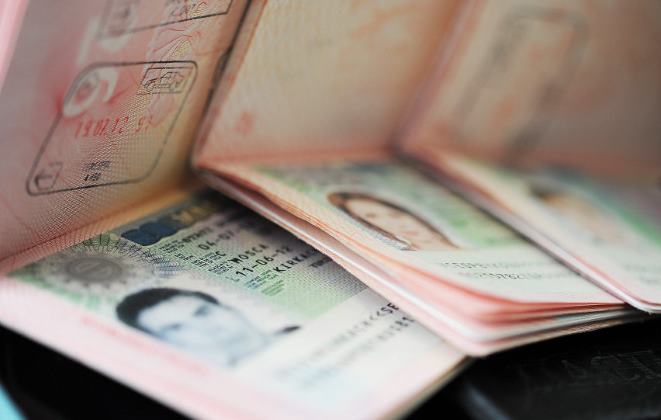
In order to obtain a visa to work in Germany, first of all, you need to decide on the type of document you need. If it involves concluding a preliminary contract with a German enterprise, organization or other category of legal entities or individuals, then this document must first be drawn up.
You must then make an appointment with an organization that is authorized to issue visas. After paying the visa fee, submitting an application and a package of required documents, and sometimes also passing an interview, all that remains is to wait for a positive decision and come for the finished visa on the appointed day.
However, before you go to the embassy or consulate, you should find out what documents the German embassy needs for a work visa.
List of required documents
When applying for a German work visa of any kind, you are required to provide:
- a foreign passport, which must have at least 2 blank pages. The validity of this document must exceed the validity of the visa for which you are applying by at least 3 months;
- national passport of a citizen of the Russian Federation;
- work book and work biography, where all the enterprises at which you worked should be indicated in tabular form in chronological order;
- motivation letter;
- Diplomas and certificates confirming your professional skills in accordance with the requirements for the visa category for which you are applying, including proficiency in German;
- 3 color photographs, 3.5 × 4.5 cm;
- a health insurance policy covering at least 2 weeks of stay in the country;
- two completed copies of the visa application form.
In cases where the type of visa you choose involves concluding an employment contract, in order to obtain a work visa to Germany for Russians, the contract must indicate:
- names and contacts of the parties entering into the contract;
- start and end dates of the employment contract;
- conditions of probation;
- address of the applicant’s workplace and his direct work responsibilities;
- salary amount;
- duration of working hours and schedule of working days;
- duration of leave and conditions for its provision;
- the period during which the applicant is obliged to inform the employer about the planned termination of the contract;
- terms of payment for medical expenses;
- signatures of the parties and date of conclusion of the agreement.
A template of this document can be found in English, German and Russian. In this case, only the copy in German has legal force.
Where can I apply?
Visa applications are accepted and ready documents are issued by: the German Embassy in Russia, the consulates of this country, as well as some visa centers. Below you will find a list of contacts of these organizations in major cities of the Russian Federation.
Diplomatic representations of Germany The German Embassy in Russia is located in Moscow at the address: Leninsky Prospekt, building 95A.
The German Consulates General, which have the right to issue work visas, are located:
- in Yekaterinburg on Kuibysheva Street, 44;
- in Novosibirsk at the address: Krasny Prospekt, 28;
- in Kaliningrad on Telman Street, 14;
- in St. Petersburg on Furshtatskaya street, 39.
Official Visa Application Centers
German work visas can be issued at the following visa service centers:
- in Moscow on the street. Shabolovka, 31, building 5;
- in St. Petersburg on the street. Bolshaya Raznochinnaya, 16;
- in Nizhny Novgorod on the street. Shcherbakova, 15;
- in Kazan on the street. Paris Commune, 8;
- in Chelyabinsk on the street. Karl Marx, 54;
- in Krasnodar on the street. Academician Pavlova, 64, letter A1;
- in Omsk on the street. Red Path, 101;
- in Rostov-on-Don on the street. Trolleybusnaya, 24/2v;
- in Samara on the street. Michurina, 78.
Failures
Refusals are common. Strict migration policies and restrictive measures against migrant workers create unfavorable conditions. The most common reasons lie in violation of established rules:
- Providing false data;
- Violation of visa regulations and border control rules in the past;
- Expired validity of certificates and documents;
The visa inspector will issue a notice of a negative decision if there are suitable candidates for the proposed vacancy among native Germans who are citizens of the European Union. Legally, it is possible to appeal, but a review of the decision is unlikely.
